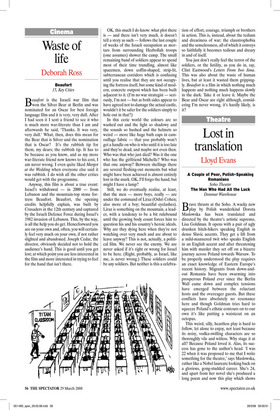Waste of life
Deborah Ross
Beaufort 15, Key Cities
Beaufort is the Israeli war film that won the Silver Bear at Berlin and was nominated for an Oscar for best foreign language film and it is very, very dull. After I had seen it I sent a friend to see it who is much more war-literate than I am and afterwards he said, ‘Thanks. It was very, very dull.’ What, then, does this mean for the Bear that is Silver and the nomination that is Oscar? It’s the rubbish tip for them, my dears; the rubbish tip. It has to be because as you know, and as my more war-literate friend now knows to his cost, I am never wrong. I even quite liked Margot at the Wedding when everyone else said it was rubbish. I do wish all the other critics would get with the programme.
Anyway, this film is about a true event: Israel’s withdrawal — in 2000 — from Lebanon and the mountain-top stone fortress Beaufort. Beaufort, the opening credits helpfully explain, was built by Crusaders in the 12th century and captured by the Israeli Defence Force during Israel’s 1982 invasion of Lebanon. This, by the way, is all the help you do get. Henceforward you are on your own and, often, you will certainly feel very much on your own, if not rather slighted and abandoned. Joseph Cedar, the director, obviously decided not to hold the audience’s hand. This is good until you get lost; at which point you are less interested in the film and more interested in trying to feel for the hand that isn’t there. OK, this much I do know: what plot there is — and there isn’t very much, it doesn’t tell a story as such — follows the last couple of weeks of the Israeli occupation as mortars from surrounding Hezbollah troops (one assumes) shower the camp. The small remaining band of soldiers appear to spend most of their time trundling, almost like spacemen, down coffin-shaped, strip-lit, subterranean corridors which is confusing until you realise that they are not occupying the fortress itself, but some kind of modern, concrete outpost which has been built adjacent to it. (I’m no war strategist — seriously, I’m not — but as both sides appear to have agreed not to damage the actual castle, wouldn’t it be safer for the soldiers simply to hole out in that?) In this eerie world the colours are so washed out and the light so shadowy and the sounds so hushed and the helmets so weird — more like huge bath caps in camouflage fabric — that you probably won’t get a handle on who is who until it is too late and they’re dead, and maybe not even then. Who was that who just died? Was it the one who has the girlfriend Michelle? Who was that one anyway? Between shellings there are several fleshing-out moments but what might have been achieved is almost entirely lost in the murk. OK, I’ll forgo the hand, but might I have a lamp?
Still, we do eventually realise, at least, that the men — more boys, really — are under the command of Liraz (Oshri Cohen; also more of a boy; beautiful eyelashes). Liraz is something on the mountain, a leader, with a tendency to be a bit rulebound until the growing body count forces him to question his and his country’s heroic ideals. Why are they dying here when they’re not watching over very much and are about to leave anyway? This is not, actually, a political film. We never see the enemy. We are never asked if it’s right or wrong for Israel to be here. (Right, probably, as Israel, like me, is never wrong.) These soldiers could be any soldiers. But neither is this a celebra tion of effort, courage, triumph or brothers in action. This is, instead, about the tedium and dreariness of war; the claustrophobia and the senselessness, all of which it conveys so faithfully it becomes tedious and dreary in and of itself.
You just don’t really feel the terror of the soldiers, or the futility, as you do in, say, Clint Eastwood’s Letters From Iwo Jima. This was also about the waste of human lives, but at least it wasted them grippingly. Beaufort is a film in which nothing much happens and nothing much happens slowly in the dark. Take it or leave it. Maybe the Bear and Oscar are right although, considering I’m never wrong, it’s hardly likely, is it?
















































































 Previous page
Previous page